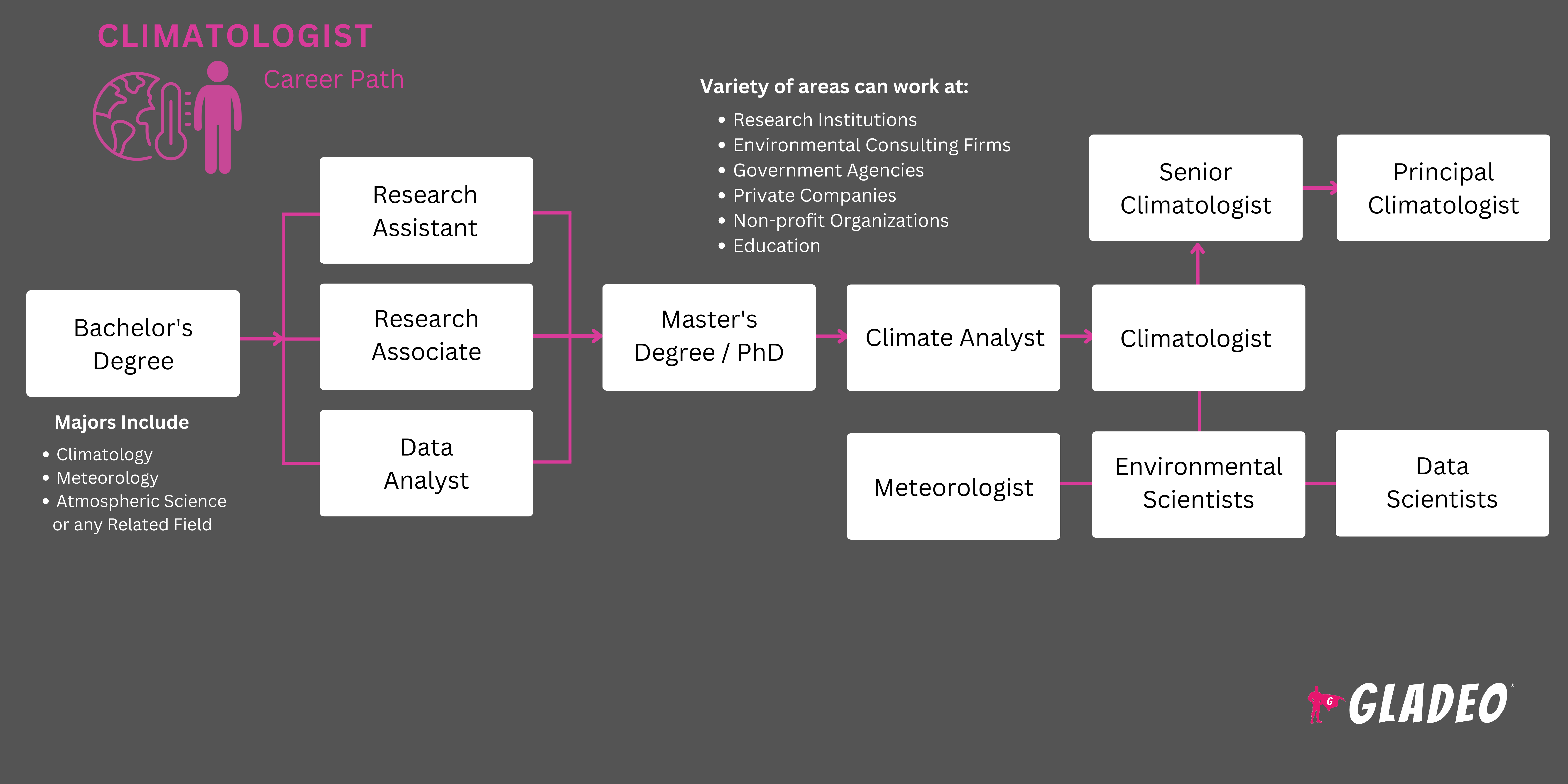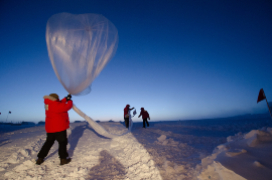스포트라이트
기후 과학자, 기상학자, 대기 과학자, 환경 과학자, 기후 변화 분석가, 고생물 기후학자
과학자들의 최선의 추정에 따르면 지구의 나이는 45억 년입니다. 그 오랜 역사를 통해 지구의 기후는 상당히 변화해왔고 지금도 계속 변화하고 있습니다!
기후학자는 미래의 변화와 다가올 날씨 패턴을 예측하기 위해 이러한 변화를 연구하는 과학자입니다. 이들은 통계적 방법, 컴퓨터 모델, 위성, 기상 관측소 및 원격 센서의 데이터를 사용하여 장기간에 걸친 기온, 강수량, 바람 및 기타 기상 조건의 추세를 분석합니다.
이들의 귀중한 연구는 자연 과정과 인간 활동이 지구 및 지역 기후에 미치는 영향에 대한 이해를 높여 정부 기관과 상업 조직이 그에 따라 대응하고, 미리 계획하고, 필요에 따라 예방 조치를 취할 수 있도록 합니다.
기후학자는 다음과 같이 다양한 유형이 있습니다:
- 응용 기후학자: 기후 데이터를 사용하여 실질적인 문제를 해결합니다.
- 생물 기후학자: 기후와 생물체 사이의 상호작용을 탐구합니다.
- 기후 데이터 분석가: 데이터 세트의 처리, 분석, 해석을 전문으로 합니다.
- 기후학 교육자: 기후학 및 관련 과목을 가르칩니다.
- 미기후학자: 소규모 기후 변화에 집중합니다.
- 고기후학자: 과거의 기후를 조사합니다.
- 물리 기후학자: 대기를 제어하는 물리적 과정을 연구합니다.
- 시놉틱 기후학자: 대규모 기후 패턴과 현상을 분석합니다.
- 환경 문제에 대한 인식을 높이는 데 전념하는 분야에서 일하고 있습니다.
- 정책 결정에 정보를 제공하여 모든 사람의 삶의 질을 개선하는 데 잠재적으로 도움이 됩니다.
- 환경 보호 노력 촉진 및 지속 가능한 관행 장려
근무 일정
- 기후학자들은 대부분의 업무를 실내에서 풀타임으로 수행하지만, 원격 센서 현장과 기상 관측소를 방문하는 현장 업무도 수행해야 할 수 있습니다.
일반적인 의무
- 장기적인 기상 패턴과 추세를 연구하고, 인간 활동이 기후에 미치는 영향을 연구합니다.
- 샘플을 수집하거나 기상 현상을 직접 관찰하기 위한 현장 조사 수행
- 기상 관측소 설치 및 유지 관리, 토양 샘플 채취, 대기 데이터 수집
- 특정 사이트를 방문하여 가뭄, 홍수 또는 기타 기후 관련 사건의 영향을 받는 지역과 같이 국지적인 기후 영향을 파악하세요.
- 필요에 따라 극지방, 숲, 산, 바다와 같은 장소로 이동하여 고유한 데이터를 수집합니다.
- 위성 이미지, 기상 관측소, 기후 데이터베이스의 데이터로 작업하기
- 과거 기후 데이터를 분석하여 과거의 변화를 이해하고, 컴퓨터 모델을 사용하여 미래의 기후 변화를 예측합니다.
- 기상학이나 해양학 등 관련 분야의 과학자와 협업하기
- 학제 간 팀과 협력하여 기후 변화가 생태계와 사회에 미치는 광범위한 영향을 이해합니다.
- 과학 저널에 연구 결과를 발표하고 컨퍼런스에서 발표하기
- 연구 결과에 대해 토론하고 회의에 참석 또는 발표하기
- 대중과 이해관계자에게 복잡한 기후 개념 전달하기
- 기후 관련 문제 및 잠재적 완화 전략에 대한 정책 입안자 자문
- 국제 기후 평가 및 보고서에 기여
추가 책임
- 연구 결과를 최신 상태로 유지하고, 과학 저널을 읽고, 논문을 작성하세요.
- 기후학 분야의 최신 기술 및 방법론에 대한 최신 정보를 확인하세요.
- 더 나은 기후 모델링 및 예측을 위한 도구 개발 및 개선 작업
- 도시 계획가와 협력하여 기후 회복력 있는 도시 설계하기
- 기후 변화가 생물 다양성 및 보존 노력에 미치는 영향을 평가합니다.
- 기후 조절과 변화에서 해양의 역할 분석하기
- 지속 가능한 수자원 관리를 위한 전략 개발
- 농업 부문에 예상되는 변화와 작물 수확량에 대한 잠재적 영향에 대한 조언 제공
- 엔지니어와 협력하여 탄소 격리 및 온실가스 감축을 위한 기술을 개선합니다.
소프트 스킬
- 분석
- 합작
- 비판적 사고
- 의사 결정
- 세부 지향적 인
- 환경적 사고방식
- 윤리
- 융통성
- 무결성
- 객관성
- 끈기
- 인내
- 문제 해결
- 프로젝트 관리
- 품질 보증
- 연구 중심
- 안전 지향적 인
- 건전한 판단과 추론
- 강력한 의사 소통 기술
기술 능력
- 연방 기관
- 지역 및 주 기후 센터
- 주 환경 보호 부서 및 기관
- 교육 기관
- 비정부기구(NGO)
기후학자들은 지구의 기후 역학을 이해하는 데 앞장서고 있습니다. 기후 변화와 관련된 긴급한 문제가 대두되면서 기후학자들의 전문 지식이 각광받고 있습니다. 기후학자들은 방대한 데이터 세트를 분석하여 과거와 미래의 기후 패턴에 대한 인사이트를 제공합니다.
또한 정책 입안자와 대중을 위해 복잡한 연구 결과를 번역하는 일도 맡고 있습니다. 따라서 환경 보존, 도시 계획 및 글로벌 기후 전략을 수립하는 데 도움을 줍니다.
현장 연구를 수행하려면 장기간 외딴 곳으로 이동해야 하기 때문에 친구나 사랑하는 사람들과 떨어져 지내야 합니다. 또한 연구에는 장시간의 데이터 분석이 필요하기 때문에 피곤하고 단조로울 수 있습니다.
이 분야에서 눈에 띄는 추세 중 하나는 정교한 계산 모델과 도구의 사용이 증가하고 있다는 것입니다. 이러한 도구는 위성, 지상 관측, 해양 부표에서 얻은 방대한 양의 데이터와 결합하여 기후학자들이 미래 기후 시나리오를 보다 정확하게 예측할 수 있도록 지원합니다.
기후학의 또 다른 트렌드는 기후 영향을 이해하기 위한 다학제적 접근 방식입니다. 날씨 변화가 우리의 건강, 가정, 식량 공급뿐만 아니라 환경에도 어떤 영향을 미치는지 인식하는 것이 중요합니다.
사회학, 경제학, 공중 보건과 같은 분야의 연구 결과를 기후 연구에 통합하는 것이 점점 더 강조되고 있습니다. 이러한 접근 방식은 정책 입안자들이 변화하는 기후 상황에 대처하는 것과 관련하여 보다 정보에 입각한 결정을 내리는 데 도움이 됩니다.
기후학자들은 항상 날씨의 역동성과 기후에 매료되어 있었을 것입니다. 어릴 때부터 소용돌이치는 구름부터 계절의 변화에 이르기까지 하늘의 경이로움에 매료된 사람들이 많았기 때문이죠. 이들은 분석적이고 공부에 관심이 많으며, 이러한 특성은 가정이나 학교에서 다양한 활동을 통해 길러졌을 것입니다!
- 기후학자는 기상학 및 기후학, 대기 과학, 환경 과학, 화학 또는 물리학 등 적합한 분야의 학사 학위 이상을 소지해야 합니다.
- 학생들은 위의 과목 중 하나를 전공하면서 기후학 또는 기후 과학을 부전공하거나 전공 할 수 있습니다.
- 일반적인 학부 수업에는 다음이 포함될 수 있습니다:
- 대기 화학
- 대기 열역학
- 기후 모델링
- 동적 기상학
- 환경 과학
- 글로벌 기후 시스템
- 수문학 및 수자원
- 해양학
- 고기후학
- 물리적 지리
- 원격 감지 및 GIS
- 지구 과학 통계
- 연구 및 학술 직무는 일반적으로 대기과학 석사 또는 기후학 및 지리정보시스템 박사 등의 대학원 학위가 필요합니다.
- 인턴십은 학생들이 회사 또는 대행사에서 일하면서 배울 수 있는 귀중한 실습 경험을 제공할 수 있습니다.
- 기후 변화 책임자 협회의 기후 변화 전문가와 같은 중견 및 고위급 전문가를 위한 선택적 인증이 있습니다.
- 수업료, 할인 및 지역 장학금 기회 비용을 고려하십시오 (연방 지원 이외에)
- 캠퍼스 내, 온라인 또는 하이브리드 프로그램에 등록할지 여부를 결정할 때 일정과 유연성에 대해 생각하십시오. 이상적으로는 가능한 한 많은 실습을 원할 것입니다.
- 프로그램의 시설, 장비 및 현재 연구 현황을 자세히 살펴보세요.
- 프로그램의 교수진 수상 경력 및 성과를 확인하세요.
- 취업 알선 통계 및 프로그램의 동문 네트워크에 대한 세부 정보를 검토하십시오.
- 기후학자는 영어, 대수학, 기하학, 삼각법, 미적분학, 미적분학, 생물학, 화학, 물리학, 지질학, 사회학, 통계학, 환경 과학을 수강하여 대학의 엄격한 시험에 대비해야 합니다.
- 과학 박람회 관람 또는 참여
- 환경 과학, 기상학 또는 관련 분야에 초점을 맞춘 여름 캠프나 워크숍을 찾아보세요.
- 어려운 내용을 읽는 습관을 기르세요! 과학 서적, 잡지, 온라인 기사, 연구 및 정책을 통해 자신을 교육하세요.
- ' 기후 과학자에게 물어보세요 ' 등의 유튜브 채널에서 관련 동영상을 시청하고 복잡한 기후학 분야와 현재 이슈에 대해 자세히 알아보세요.
- 학교 및 지역 환경 활동에 참여하세요. 자원봉사를 하거나 아르바이트를 찾아보세요!
- 가능하면 해외에서 공부하여 기후와 기후가 다른 지역에 미치는 영향에 대한 글로벌 관점을 얻으세요.
- 관련 분야의 교사 및 전문가와 좋은 협력 관계를 구축하세요. 교수의 연구 프로젝트에 참여하거나 직접 연구 프로젝트를 시작할 수 있는 기회를 활용하세요.
- 현직 기후 전문가에게 정보 제공 인터뷰를 할 시간이 있는지 물어보세요.
- 지역 기후 관련 회의, 토론 그룹 및 기타 이벤트에 참석하세요.
- 캠퍼스 또는 거주 지역의 환경 관련 클럽과 단체에 가입하세요. 전문가 네트워크를 키우세요!
- 어떤 유형의 기후학자가 되고 싶은지 결정합니다(예: 생물기후학자, 기후학 교육자, 고기후학자, 물리기후학자, 시놉틱 기후학자 등).

- 지원 전에 학교와 자원 봉사 활동에서 최대한 많은 경험을 쌓으세요.
- 글래스도어, 인디드, 유에스에이잡스, 심플리히어드 등의 취업 포털은 일자리를 찾기 위한 가장 좋은 출발점입니다.
- 대학 프로그램 관리자 또는 학교의 직업 서비스 직원에게 도움을 요청하십시오. 그들은 지역 채용 담당자와 직접 연결될 수 있습니다!
- 네트워크에 연락하여 구직 중임을 알립니다.
- 채용 공고를 신중하게 선별하여 요구사항을 충족하고 적절한 경험을 할 수 있도록 합니다.
- 이력서에 넣을 중요한 키워드를 찾아보세요.
- 관련 업무 및 학업 경험 및 기술에 이력서를 집중하고 가능한 경우 데이터를 정량화하십시오.
- 온라인 포럼에 참여하여 커리어 조언을 구하세요.
- 교수, 감독자 및 동료에게 개인 참조 자료로 봉사 할 것인지 물어보십시오.
- 이력서, 모의 면접 및 구직에 대한 도움을 받으려면 대학 커리어 센터에 문의하세요.
- 기후학자 이력서 템플릿을 검토하여 서식과 문구에 대한 아이디어를 얻으세요.
- 중요한 면접에 대비하기 위해 자주 묻는 면접 질문을 찾아보세요.
- 성공적인 면접을 위해 항상 적절한 복장을 갖추세요!
- 고용주가 온라인에서 귀하를 조회하기 때문에 소셜 미디어 존재를 전문적으로 유지하십시오.
- 기후학자는 초급 직급에서 시작하여 승진을 거듭할 수 있습니다.
- 상사와 이야기하세요. 고용주가 제안하는 모든 전문성 개발 교육에 참여할 의향이 있음을 상사에게 알리세요.
- 필요한 최소한의 경력이 있으면 고급 인증을 완료하세요.
- 고급 학위(예: 석사 또는 박사) 또는 전문 분야의 과정을 수강하는 것을 고려하세요.
- 기후 모델링 소프트웨어, 데이터 분석 도구, 원격 감지 기술에 대한 최신 정보를 확인하세요.
- 대기 과학의 발전, 기후 역학 또는 국제 기후학 저널과 같은 동료 심사 저널에 고품질 연구를 발표하세요.
- 기후학 및 기상학 관련 전문 단체에서 활동하기
- 해당 분야의 전문가와 인맥을 쌓고 컨퍼런스, 세미나, 워크숍에 정기적으로 참석하세요.
- 기후학이라는 어렵고 수요가 많은 틈새 분야의 전문가가 되어보세요.
- 학계에서는 리더십과 멘토링 역할을 맡으세요.
- 연구 보조금을 신청하세요! 학술 및 연구 기관에서 자금 확보 능력은 매우 중요합니다.
- 여러 기관/국제 연구 프로젝트에 참여하기
- 정부 및 비정부 조직과 협력하여 전문가 인사이트 제공
웹사이트
- 미국 지구 물리학 연합
- 미국 지구과학 연구소
- 미국 기상 학회
- 기후 및 에너지 솔루션 센터
- Climate.gov
- 기후 중앙
- 환경 보호국
- 글로벌 변화(미국 글로벌 변화 연구 프로그램)
- 기후 변화에 관한 정부 간 협의체
- MetEd
- NASA 글로벌 기후 변화
- 미국 농업 항공 협회
- 국립 대기 연구 센터
- 국립 환경 정보 센터
- 국립 해양 대기 관리국
- 국립 기상청
- 회의주의 과학
- 미국 인사 관리국
- 유엔 - 기후 행동
- 대기 연구를 위한 대학 법인
- 미국채용
저널
- 대기 과학의 발전
- 대기 화학 및 물리학
- 대기 환경
- 기후와 개발
- 기후 역학
- 기후 변화
- 보존 생리학
- 환경 연구 편지
- 산림 생태 및 관리
- 지구물리학 연구 편지
- 글로벌 및 지구적 변화
- 글로벌 변화 생물학
- 글로벌 건강 행동
- 국제 생물기상학 저널
- 국제 기후학 저널
- 국제 환경 연구 및 공중 보건 저널
- 청정 생산 저널
- 기후 저널
- 수문학 저널
- 대기 과학 저널
- 자연 기후 변화
- 고고지리학, 고기후학, 고생태학
- 영국왕립기상학회 분기별 저널
- 제4차 과학 리뷰
- 총체적 환경의 과학
- 이론 및 응용 기후학
- 수자원 연구
책
- 기후학, 로버트 롤리와 앤서니 베가의 저서
- 기후학: 기후학: 대기 과학, 존 히도레, 존 올리버 외 저.
- 지구 물리 기후학, 데니스 하트만의 글
전 세계는 미래를 대비하기 위해 기후를 연구하는 기후학자를 최전선에서 필요로 합니다. 하지만 인간이 초래한 기후 변화는 여전히 논쟁과 논란의 대상이 되고 있습니다. 관련 직업에 관심이 있는 분들을 위해 고려할 수 있는 몇 가지 대안을 소개합니다!
- 천문학자
- 보존 과학자
- 데이터 과학자
- 환경 과학자 및 전문가
- 측지 측량사
- 지리학자
- 지리 정보 시스템 기술자
- 지질 기술자
- 지구과학자
- 수문학자
- 산업 생태학자
- 원격 감지 과학자
뉴스 피드

주요 채용 정보

온라인 과정 및 도구

연봉 기대치
신입 직원의 초봉은 약 $88,000입니다. 중간 급여는 연간 $97,000입니다. 고도로 숙련된 근로자는 약 112,000달러를 받을 수 있습니다.
연봉 기대치
신입 직원의 초봉은 약 8만 5천 달러입니다. 중간 급여는 연간 12만 달러입니다. 고도로 숙련된 근로자는 약 $138,000를 받을 수 있습니다.
연봉 기대치
신입 직원의 초봉은 약 7만 달러입니다. 중간 급여는 연간 9만 달러입니다. 고도로 숙련된 근로자는 약 $114,000를 받을 수 있습니다.
연봉 기대치
신입 직원의 초봉은 약 6만 5천 달러입니다. 중간 급여는 연간 $92,000입니다. 고도로 숙련된 근로자는 약 11만 7천 달러를 벌 수 있습니다.
연봉 기대치
신입 직원의 초봉은 약 8만 4천 달러입니다. 중간 급여는 연간 $97,000입니다. 고도로 숙련된 근로자는 약 119,000달러를 받을 수 있습니다.






